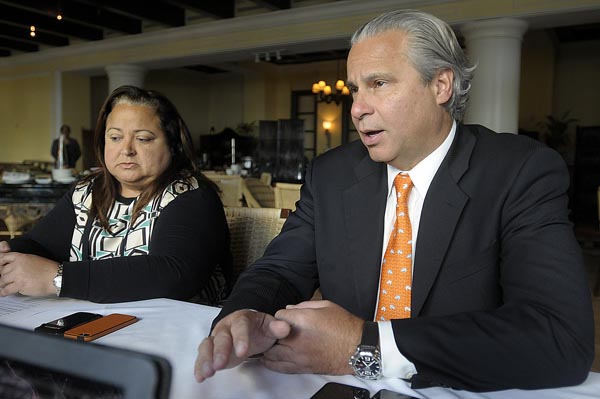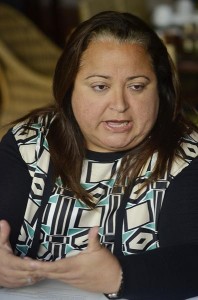AGP economic team patching things up with pharmas


From left: Treasury Secretary-designate Melba Acosta and Economic Development and Commerce Secretary-designate Alberto Bacó. (Credit: © Mauricio Pascual)
Gov. Alejandro García-Padilla’s economic team is working on patching things up with pharmaceutical companies doing business in Puerto Rico, which they said Wednesday have “lost trust” in the island’s government.
During a roundtable with business reporters, Economic Development and Commerce Secretary-designate Alberto Bacó and Treasury Secretary-designate Melba Acosta offered details of a meeting held earlier in the day with representatives from seven pharmaceuticals with local operations that sought to vent their concerns to the new administration.
“They told us this was the first time they held a meeting with the government’s chief economic development officials to discuss their concerns and suggestions,” said Bacó, noting that Government Development Bank President-designate Javier Ferrer, GDB Board Chair David Chafey, Puerto Rico Industrial Development Company Executive Director-designate Antonio Medina, Tourism Company Executive Director-designate Ingrid Rivera and Puerto Rico Trade Executive Director-designate Francisco Chévere were also present .
During the gathering organized by the Puerto Rico Pharmaceutical Industry Association, about seven chief tax officers representing as many companies outlined their concerns to the incoming group, stressing on the issues of transparency and trust, Bacó said.
“This was a meeting to start a dialogue. They basically told us that certain things were done in the past lacking the transparency they should have had,” he said.
Specifically, the companies brought up the way Law 154 — which levies a tax on controlled foreign corporations doing business in Puerto Rico — was passed by the Legislature and signed by former Gov. Luis Fortuño over a weekend in October 2010, without public participation.
“Their concern wasn’t so much the law, but the way it was done. Nobody likes to pay taxes, but many of them have been able to take deductions on what they pay the Puerto Rico government,” Bacó said. “This was a matter of the element of surprise, the fact that they weren’t able to plan for the new expense.”

Acosta offered details of a meeting held earlier in the day with representatives from seven pharmaceuticals with local operations that sought to vent their concerns to the new administration. (Credit: © Mauricio Pascual)
They also brought up issues related to their operations in general, such as the upcoming patent expiration cycle and the lack of new medications in the immediate pipeline, Acosta noted.
“They spoke to us about what they’re calling the ‘patent cliff,’ which basically addresses the number of patents that are expiring and what that means to their operations,” Acosta said. “They also addressed changes in federal tax laws and said they would be willing to present proposals to amend Puerto Rico’s Tax Code that would be beneficial all around.”
Still, she said the new government was clear with the companies about its ongoing fiscal problems.
“But the thing is that without economic development, our fiscal problems will continue to drag on. We were looking to convey to them our interest in them retaining their operations on the island and bringing new lines of business if they decide to pull out of other countries or jurisdictions,” Acosta noted.
Wednesday’s meeting is the first of several on the agenda between the groups, with the next one scheduled for March, Bacó said.
At that time, the companies are expected to be able to present their concrete proposals to move their sector along, which the government will take under consideration, he added.
“Our challenge here is to have no plant closings. That they feel comfortable with their employee base, their tax reality and an open relationship with the government,” he said. “However, in the same way they’re asking us for transparency, we asked them to let us know ahead of time any decision of a potential closing so that we can work with them on options.”
For now, Law 154 will remain intact, levying a 3.75 percent tax on foreign companies doing business in Puerto Rico, the government officials confirmed.














